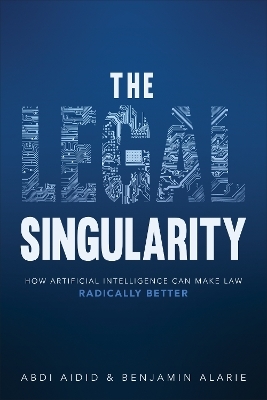
The Legal Singularity
University of Toronto Press (Verlag)
978-1-4875-2941-3 (ISBN)
Law today is incomplete, inaccessible, unclear, underdeveloped, and often perplexing to those whom it affects. In The Legal Singularity, Abdi Aidid and Benjamin Alarie argue that the proliferation of artificial intelligence–enabled technology – and specifically the advent of legal prediction – is on the verge of radically reconfiguring the law, our institutions, and our society for the better.
Revealing the ways in which our legal institutions underperform and are expensive to administer, the book highlights the negative social consequences associated with our legal status quo. Given the infirmities of the current state of the law and our legal institutions, the silver lining is that there is ample room for improvement. With concerted action, technology can help us to ameliorate the problems of the law and improve our legal institutions. Inspired in part by the concept of the "technological singularity," The Legal Singularity presents a future state in which technology facilitates the functional "completeness" of law, where the law is at once extraordinarily more complex in its specification than it is today, and yet operationally, the law is vastly more knowable, fairer, and clearer for its subjects. Aidid and Alarie describe the changes that will culminate in the legal singularity and explore the implications for the law and its institutions.
Abdi Aidid is a graduate of Yale Law School and assistant professor of law at the University of Toronto. Benjamin Alarie holds the Osler Chair in Business Law in the Faculty of Law, University of Toronto and is an affiliated faculty member at the Vector Institute for Artificial Intelligence.
1. Introducing the Legal Singularity
I. Introduction
II. What Is the Legal Singularity?
a. The Technological Singularity
b. The Economic Singularity
c. The Legal Singularity
III. Hazards Ahead
IV. Our Story and Objectives
V. Orienting Ourselves
VI. Towards the Legal Singularity
2. The Nature of Legal Information
I. Introduction
II. The Centrality of Information to Law
a. Law before Text
b. Prediction and Law’s Information Environment
III. Analogue, Digital, Computational
a. The Analog Era
b. The Digital Era
IV. The New Information Environment
a. Impact of Digitalization
b. Access to Data and Access to Justice
c. An Open Source Movement?
3. Computational Law
I. Introduction
II. Understanding Artificial Intelligence
III. Applying AI to the Law: Computational Law
a. Should Law Be Computed?
b. On “Computational Values”
4. Complete Law
I. Introduction
II. Incomplete Law and Its Problems
a. What Is Incomplete Law?
b. In Search of Specificity
c. Degradation of Legal Certainty
III. How Computation Encourages Completeness
IV. Complete, as in No Gaps – Not Complete, as in Done
5. Defending the Legal Singularity from Its Critics
I. Introduction
II. Is Computational Law Reductionist?
a. Pasquale, Hildebrandt, and Law’s Unquantifiable Essence
b. Ideology, Social Context, and the Legal Singularity
c. The Limits of Techno-Critique
III. Does the Legal Singularity Threaten the Rule of Law?
6. Implications for the Judiciary
I. Introduction
II. The Pitfalls of the Modern Judiciary
a. Biases and Human Weaknesses
b. Courthouse Overcrowding and Delayed Justice
c. The Implications of Court Design
III. Computational Solutions in the Courtroom
a. Human Experts
b. Legal Research
c. Document Drafting
d. Expert Evidence
e. Changes to Fact-Finding Procedures
f. Discovery
g. Predictive Technology
h. Case Management
i. Fair Settlements
IV. The Paradox of Judging in the Computational Era
a. Beyond Physical Courtrooms and Human Judges
i. Neural Laces
ii. Online Courts and Dispute Resolution
iii. Alternative Dispute Resolution
V. Possible Roadblocks to Adoption
VI. Looking Ahead: The Evolution of the Judiciary
7. Towards Universal Legal Literacy
I. Introduction
II. The Legal Profession’s Problem State
a. Problem I: The Market for Legal Services
i. The Unaffordability Problem
ii. Consequences of Unaffordability
iii. Responses to the Unaffordability Problem by the Legal Profession
b. Problem II: Excessive Legal Complexity
III. The Solution: Universal Legal Literacy
a. Imagining Universal Legal Literacy
b. Universal Legal Literacy in the Legal Singularity
8. Implications for Governments
I. Introduction
II. Governments and Technology
III. Artificially Intelligent Governments
IV. Current Government Applications of AI
V. Applications of AI in Service Provision and Regulation
a. Tax Regulation
b. Government Benefits Programs
c. Immigration
VI. Applications of AI in Legislation
a. Drafting Legislation
b. Normative Contributions and Second-Order Modelling
9. Towards Ethical and Equitable Legal Prediction
I. Introduction
II. The Problem Framework
a. Reflection and Amplification Problems
b. Techno-Epistemic Problems
10. Conclusion
Afterword
Acknowledgments
Index
| Erscheinungsdatum | 22.12.2022 |
|---|---|
| Zusatzinfo | 6 b&w figures |
| Verlagsort | Toronto |
| Sprache | englisch |
| Maße | 159 x 235 mm |
| Gewicht | 420 g |
| Themenwelt | Recht / Steuern ► Allgemeines / Lexika |
| Recht / Steuern ► EU / Internationales Recht | |
| Recht / Steuern ► Strafrecht ► Kriminologie | |
| Sozialwissenschaften ► Soziologie | |
| ISBN-10 | 1-4875-2941-4 / 1487529414 |
| ISBN-13 | 978-1-4875-2941-3 / 9781487529413 |
| Zustand | Neuware |
| Haben Sie eine Frage zum Produkt? |
aus dem Bereich


